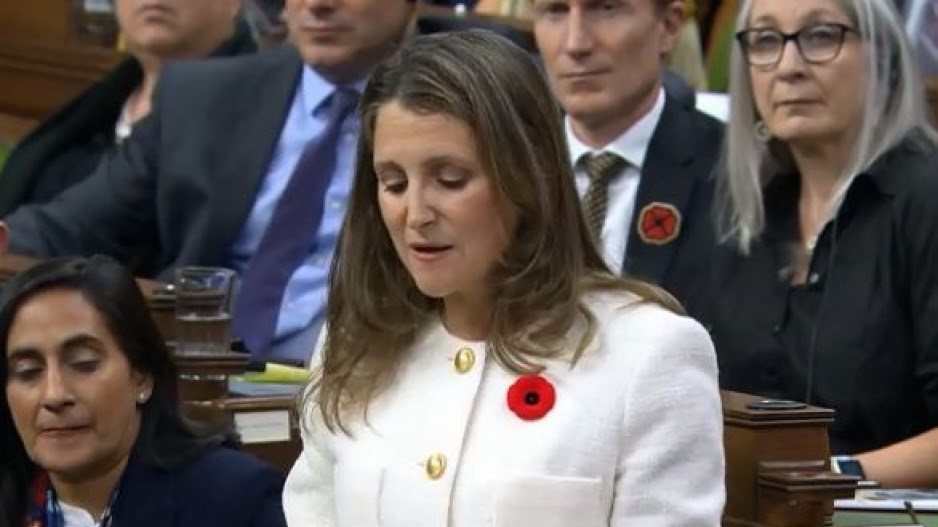Oil and gas companies that have been reaping windfalls from high oil prices will be discouraged from returning some of those profilts to shareholders through share buybacks.
Share buybacks are a way that publicly traded companies reward shareholders. But publicly traded companies will now be taxed on those buybacks at 2%. The measure was introduced in a mini budget brought down Thursday by federal Finance Minister Chrystia Freeland.
The move appears aimed at big publicly traded companies -- notably oil and gas companies- - that have been using windfalls from high oil prices to pay down debt and reward shareholders, rather than use the profits to reinvest.
"We're taxing share buybacks to make sure that large corporations pay their fair share and to encourage them to reinvest their profits in Canadian workers and in Canada," Freeland said.
In her fall economic forecast, Freeland acknowledged that high inflation and rising interest rates will put a drag on the Canadian economy. The new economic forecast notes Canada had annualized GDP growth of 3.2% in the first half of 2022, but acknowledges Canada's economy is now slowing. That slowing growth has been largely in housing markets.
“Canada cannot avoid the global slowdown, anymore than we could have avoided COVID," Freeland said.
The update now forecasts GDP growth of less than 1% in 2023. A survey of economists in September warns that real GDP growth is now projected to be "just above zero for the next several quarters.
"As a result, the unemployment rate was expected to increase from the current rate of 5.2% to 6.3% by the end of 2023," the update says.
The one upside to inflation is that it has boosted the value of Canadian commodity exports -- notably oil and gas.
"Despite lower growth prospects since Budget 2022, the Canadian economy has seen a significant boost to national income from higher commodity prices following Russia’s illegal invasion of Ukraine," the economic update notes. "Higher prices for a range of commodities that Canada exports pushed up our terms of trade (the ratio of export prices to import prices) to an all-time high in the second quarter of 2022."
An inflation-driven recession poses a quandary for governments. They feel obliged to help citizens struggling with higher costs with things like rebates, but being too free with borrowed money can add fuel to inflationary fires. Freeland is opting to continue to increase federal spending.
The economic update includes $7.3 billion in additional spending for 2022-2023 that was not in the April budget, and about $22 billion in additional spending over six years out to 2028.
Freeland said Thursday her government will provide assistance for Canadians struggling with inflation and high housings costs. For one thing, her government is temporarily doubling the GST rebates for 11 million Canadians, for a period of six months. The cheques are literally in the mail, and many Canadians can expect the rebates to show up in direct deposit bank accounts tomorrow.
The federal government will also top up the Canada Housing Benefit for low-income renters with a $500 tax-free payment, and will add $4 billion over four years to the Canada Workers Benefit, which is a refundable tax credit for low-income workers.
"This measure would provide, split between three advance payments, up to $714 total for single workers, and $1,231 total for a family to help cope with the rising cost of living," the update says.
Other new measures in Freeland's mini-budget include measures to address affordability, including:
- eliminating interest on federal student and apprentice loans;
- doubling of the First-Time Home Buyers’ Tax Credit; and
- a new tax-free first home savings account.
For business, there are also some new tax breaks and incentives. For small business, the federal government is lowering credit card transaction fees. It is also introducing a new refundable Clean Technology Investment Tax Credit equal to 30% of the capital cost of equipment and technology, like heat pumps, renewable energy and storage, and electric or hydrogen fuel cell vehicles for "non-road use" and small modular nuclear reactors.
Clean Energy Canada and the Mining Association of Canada (MAC) both applauded the new clean technology tax credit.
“This investment tax credit will serve to benefit Canada’s mining industry in several ways as the deployment of zero emission vehicles and non GHG emission solutions is accelerating across our sector,” said MAC president Pierre Gratton.
In the 2022 federal budget in April, the federal deficit was projected to be $52.8 billion for 2022-2023. The fall economic update trims that down to $36.4 billion. The federal deficit ballooned during the COVID-19 pandemic, which not only evaporated tax revenues for the government, but also resulted in significant emergency pending programs.
Freeland said Canada's deficit and debt-to-GDP ratio are the lowest among G7 nations. In April, Freeland said her government committed to bringing the federal debt down to 2% of GDP this year.
"Today, we forecast it will be just 1.3% of our $2.8 trillion economy," Freeland said. "We can bring the deficit down today because our pandemic spending worked. Thanks to the historic support we provided, and thanks to the incredible resilience of Canadians, Canada is entering this time of a slowing global economy from a position of fundamental economic strength."
She said there are 400,000 more Canadians employed today than before the pandemic.




